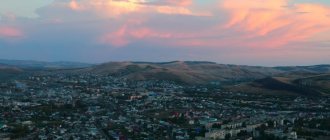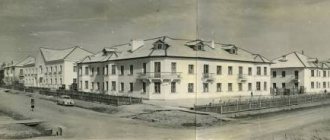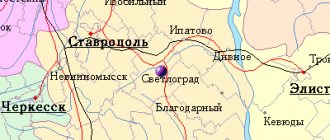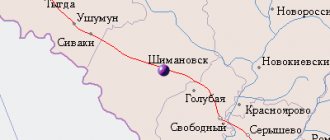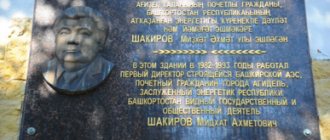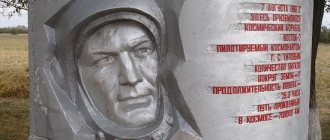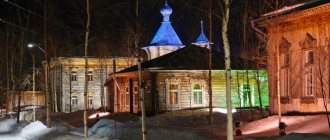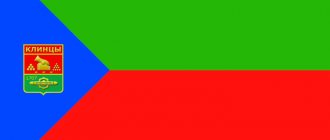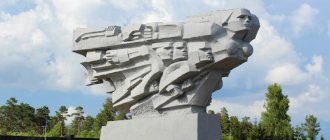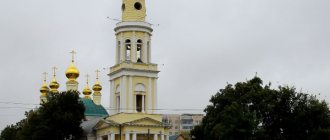Kharabali
(Astrakhan region)
OKATO code:
12245501
Founded:
1770
City since:
1974 City of district subordination (Kharabalinsky district of the Astrakhan region)
Center:
Kharabalinsky district
Telephone code (reference phone)
| 85148***** | 51-409 |
Deviation from Moscow time, hours:
1
Geographical latitude:
47°24′
Geographical longitude:
47°15′
Altitude above sea level, meters:
0 Sunrise and sunset times of the Sun and Moon in the city of Kharabali
Kharabali is a city of unlove. Our trip
AST-NEWS.ru correspondent Dinar Khisamov visited the city of Kharabali in the Astrakhan region last Sunday.
There are several versions of the origin of the city's name. According to one, it came from a hillock that once divided the settlement into two parts. Kharabali translated from Kalmyk means black hillock. According to another version, the name comes from the name of the Kazakh village of Karabaily, located on this place. Kazakhs still call this area that way.
It seems that not much has changed here since the city was founded. A guest who arrives here is greeted by a small square on which there is a small railway stop and an equally small bus ticket office, similar to a guard booth. There are no waiting areas nearby in the form of regular benches or public toilets. The road to the center of the town is marked by a single road sign “Center”. There are two kilometers to it along the street named after Bogdan Khmelnitsky, without any pedestrian sidewalk, only from time to time old Soviet tiles were visible underfoot.
Complete absence of road signs, markings and traffic lights along the way.
I hoped that closer to the center the picture would change, and there would be at least something similar to the city, but I was mistaken. At the intersection of the central streets - B. Khmelnitsky and Lenin - the picture was the same. Collapsing steps near the district court building and the sidewalk along the entire Lenin Street.
On the main street of the city, under a sign warning about the ban on trade, there is a small market.
So far no one has been involved in the improvement of the district center in Kharabali. Only Victory Park - beautiful, small, with well-groomed trees - can please guests. But the only fountain is not working. And for some reason the playground is locked.
There is another magnificent park on Lenin Street - Komsomolsky. Here I saw not only a beautiful stele and personalized monuments to soldiers of the Great Patriotic War, but also noticed work on laying pedestrian paths. From a conversation with local residents, it turned out that this is the only place where work is being carried out under the Comfortable Urban Environment project.
The streets are littered with garbage and household waste. The bins in Kharabali are either overflowing or in terrible condition, requiring urgent replacement.
While exploring the private sector, whose neighborhoods are scattered throughout the city, I found myself in the so-called “Eighth Quarter”. Here, on the street of the same name, there are high-rise buildings. Old and unkempt. The complete absence of courtyard areas and any greenery or sidewalks is depressing. There is no asphalt surface or playgrounds. But even in courtyards that already have the above, there is nowhere to hide from the sun. There is no greenery at all. To my questions, local residents answered that dialogue with the city authorities was not working: they refused to supply irrigation water.
There are many homeless and feral dogs in this “neighbourhood” - numerous complaints and statements from residents are already being collected in volumes, but the problem has not found a solution. I would really like the administration of the city of Kharabali to pay attention to the lack of basic amenities and make efforts to improve the quality of roads. And it’s time to tackle many other problems, to clean up the dirty city. I am sure that a lot can be changed for the better without serious financial investments.
Dinar Khisamov
Map
| Kharabali: maps |
Kharabali: photo from space (Google Maps) Kharabali: photo from space (Microsoft Virtual Earth)
| Kharabali. Nearest cities. Distances in km. on the map (in brackets along roads) + direction. Using the hyperlink in the distance , you can get the route (information courtesy of the AutoTransInfo website) | |||
| 1 | Enotaevka | 24 (304) | SW |
| 2 | Sasykoli | 25 () | NW |
| 3 | Tsagan Aman (Republic of Kalmykia) | 43 (350) | NW |
| 4 | Nikolskoye | 74 (384) | NW |
| 5 | Narimanov | 91 (185) | SE |
| 6 | Verkhniy Baskunchak | 99 (175) | WITH |
| 7 | Black Yar | 111 (429) | NW |
| 8 | Akhtubinsk | 127 (135) | NW |
| 9 | Krasny Yar | 127 (223) | SE |
| 10 | Starokucherganovka | 131 () | SE |
| 11 | Astrakhan | 131 (158) | SE |
| 12 | Ilyinka | 138 () | YU |
| 13 | Nachalovo | 138 (171) | SE |
| 14 | Red Barricades | 140 () | YU |
a brief description of
Located on the Caspian lowland, on the left bank of the river. Akhtuba (a branch of the Volga), 142 km northwest of Astrakhan. Railway station (Kharabalinskaya) on the Astrakhan - Saratov line.
Territory (sq. km): 1147
Information about the city of Kharabali on the Russian Wikipedia website
Historical sketch
Founded in 1770 as the village of Kharabalinskoye, later Kharabali. The name, apparently, represents a Kalmyk adaptation of the name of the Kazakh family Kara-Balasy, whose pastures were located in close proximity to the place where the village arose.
In the materials of the 1897 population census, it is mentioned as the village of Kharabalinskoye (Kharabali) in the Enotaevsky district of the Astrakhan province.
City since 1974
Municipal indicators
| Index | 2001 |
| Demography | |
| Number of births, per 1000 population | 10.9 |
| Number of deaths, per 1000 population | 14.2 |
| Natural increase (decrease), per 1000 population | -3.3 |
| Standard of living of the population and social sphere | |
| Average monthly nominal accrued wages, rub. | 1552 |
| Average housing area per inhabitant (at the end of the year), sq.m. | 16.8 |
| Number of preschool institutions, pcs. | 4 |
| Number of children in preschool institutions, thousand people | 0.6 |
| Number of daytime educational institutions (at the beginning of the school year), pcs. | 4 |
| Number of students in daytime educational institutions, thousand people | 3.1 |
| Number of doctors, people. | 78 |
| Number of nursing staff, people. | 222 |
| Number of hospital institutions, pcs. | 1 |
| Number of hospital beds, thousand units | 0.266 |
| Number of medical outpatient clinics, pcs. | 1 |
| Capacity of medical outpatient clinics, visits per shift, thousand units. | 0.9 |
| Number of registered crimes, pcs. | 345 |
| Persons who committed crimes were identified, persons. | 323 |
| Economy, industry | |
| Number of enterprises and organizations (at the end of the year), pcs. | 1075 |
| Construction | |
| Volume of work performed by type of activity “Construction” (until 2004 - volume of work performed under construction contracts), million rubles. | 37.4 |
| Commissioning of residential buildings, thousand sq.m. of total area | 3.2 |
| Commissioning of residential buildings, apartments | 41 |
| Commissioning of preschool institutions, places | 0 |
| Commissioning of educational institutions, places | 0 |
| Commissioning of hospital facilities, beds | 0 |
| Commissioning of outpatient clinics, visits per shift | 0 |
| Transport | |
| Number of bus routes (in intracity traffic), pcs. | 1 |
| Number of passengers transported by buses per year (in intracity traffic), million people. | 0.1 |
| Connection | |
| Number of residential telephone sets of the city public telephone network, thousand units. | 2.5 |
| Trade and services to the population | |
| Retail trade turnover (in actual prices), million rubles. | 335.2 |
| Retail trade turnover (in actual prices), per capita, rub. | 18023 |
| Public catering turnover (in actual prices), million rubles. | 1.7 |
| Volume of paid services to the population (in actual prices), million rubles. | 27.4 |
| Volume of paid services to the population (in actual prices), per capita, rub. | 1487 |
| Volume of household services to the population (in actual prices), million rubles. | 1.7 |
| Volume of household services to the population (in actual prices), per capita, rub. | 92 |
| Investments | |
| Investments in fixed assets (in actual prices), million rubles. | 14.1 |
| Share of investments in fixed assets financed from budgetary funds in the total volume of investments, % | 10.6 |
Data sources:
- Regions of Russia. Main characteristics of the constituent entities of the Russian Federation: statistical collection. Goskomstat of Russia. - M:, 2003.
Economy
In Kharabali: a vegetable canning plant, a mechanical forestry enterprise (industrial wood, wicker products - baskets, vases, lampshades, etc.), a brick factory.
Vegetables, melons and rice are grown in the Kharabala region. Sheep, camels and horses are raised.
Deposits of sand and clay.
Culture, science, education
Museum of History and Local Lore.
Architecture, sights
40 km south of Kharabali is an archaeological site of the 13th century. Sarai-Batu, the former capital of the Golden Horde.
70 km to the south is Kalmytsy Khurul (Buddhist monastery, built after 1812).
| Population by year (thousands of inhabitants) | |||||||
| 1897 | 3.5 | 1996 | 19.1 | 2007 | 18.1 | 2015 | 18.0 |
| 1939 | 8.3 | 1998 | 18.9 | 2008 | 18.1 | 2016 | 18.1 |
| 1959 | 9.7 | 2000 | 18.8 | 2010 | 18.1 | 2017 | 18.0 |
| 1970 | 14.3 | 2001 | 18.6 | 2011 | 18.1 | 2018 | 18.0 |
| 1979 | 17.0 | 2003 | 18.3 | 2012 | 18.2 | 2019 | 17.8 |
| 1989 | 18.6 | 2005 | 18.2 | 2013 | 18.3 | 2020 | 17.5 |
| 1992 | 18.7 | 2006 | 18.1 | 2014 | 18.1 | 2021 | 17.3 |
Private advertisements in Kharabali, Astrakhan region and Russia
To add an advert
Astrakhan
Novice specialist
Astrakhan
Metal army beds, cots
Astrakhan
We produce custom high-pressure pipes for engines 6ch 18 22, ...
Astrakhan
Luggage delivery from Astrakhan and between cities in Russia and the CIS
123ru.net
- minute-by-minute news with a daily archive. Only here we have all the main news of the day without political censorship. “123 News” - absolutely all points of view, sober analysis, civilized debates and discussions without mutual accusations and insults. If you don’t like it, don’t want to hear it, don’t read it, read it, be mutually polite and correct in your statements. Remember that not everyone's point of view coincides with yours. Respect the opinions of others, even if you defend your views and your position. 123ru.net is a news observer. We do not impose our vision on you, we give you a snapshot of the events of the day without censorship and without cuts. News as it is—online with minute-by-minute archives for all cities and regions of Russia, Ukraine, Belarus and Abkhazia. 123ru.net - live news live! A quick search from 123ru.net is not only the opportunity to be the first to know, but also the advantage of reporting breaking news instantly in any language in the world and being heard right away. You can add your news at any moment - here.
Cities
The city of Kharabali is the administrative center of the Kharabalinsky district of the Astrakhan region. It became a city in 1974. The actual number of residents at the end of 2011 was about 18 thousand people.
The city is located on the left bank of the Ashuluk River (a branch of the Akhtuba River, which is a branch of the Volga), 142 km north of Astrakhan. Nearby is the Kharabalinskaya railway station on the Verkhniy Baskunchak - Astrakhan branch.
The surrounding area of the city is popular among amateur fishermen; there are several specialized camp sites. 40 km south of the city are the ruins of Sarai-Batu, the former capital of the Golden Horde, an archaeological site of the 13th century. 70 km south of the city is the Khosheutovsky khurul (Kalmyk Buddhist monastery), an architectural monument of the 19th century.
Education in the city of Kharabali.
In the city you can get primary and secondary education.
There are no institutions providing higher education in the city.
Economy of the city of Kharabali
Vegetables, melons and rice are grown in the Kharabala region; They raise sheep, camels, and horses. There are deposits of sand and clay. There are explored oil deposits.
There is a forestry enterprise (industrial timber, firewood, forest restoration) On the outskirts of Kharabali there is a DAPP (two-way automobile checkpoint) across the Russian border to Kazakhstan. It only admits citizens of these two states.
In the Kharabala region there is the Ashuluk military training ground, where anti-aircraft missile weapons of the air defense forces are tested and military exercises using these weapons are carried out.
History of the city of
Kharabali
The village of Kharabali was founded in 1789, when these places began to be populated by peasants fleeing serfdom; in 1804 they formed the Free Society.
1845-1890. The famous Kharabalin gardens brought world fame to the village.
1904 The railway has been laid.
1969 The beginning of land reclamation and intensive construction, including schools, kindergartens, and apartment buildings.
1974 Based on the Decree of the Presidium of the Supreme Soviet of the RSFSR dated January 31, 1974, and the Decision of the Executive Committee of the Regional Council of Workers' Deputies dated February 7, 1974 No. 90, the village of Kharabali was transformed into a city of district subordination.
| Coat of arms of the city of Kharabali. Author group: idea of the coat of arms: Natalya Anshakova (Kharabali); heraldic revision: Konstantin Mochenov (Khimki), Sergey Isaev (Moscow). Justification of the symbolism of the coat of arms of the city of Kharabali. The modern coat of arms of the municipal formation “Kharabali city” was developed on the basis of the coat of arms of the city, approved by the City Council on March 6, 1996. In a green field there are crossed ears of corn, symbolizing the agricultural direction of the region. The hills characterize the natural conditions of the area (Ber mounds). The river washing the city, in the waters of which there is an abundance of fish. The green field of the coat of arms is a symbol of spring, joy, hope, health, and fertility of the fields. Azure (blue) in heraldry is a symbol of honor, glory, devotion, truth, beauty, virtue and clear skies. Silver (white) in heraldry is a symbol of simplicity, perfection, wisdom, nobility, peace, and mutual cooperation. Gold (yellow) is a symbol of strength, wealth, greatness, intelligence and insight. Description of the coat of arms In a green field there is a mountain, accompanied on the left by an equally smaller mountain, at the head of two ears of grain crosswise; the azure (blue, light blue) chipped extremity is burdened with fish; all figures are gold. | No flag image found. Flag |
Climate
- Average annual air temperature - 10.7 °C
- Relative air humidity - 59.1%
- Average wind speed - 3.9 m/s
| Average daily air temperature in Kharabali according to NASA[5] | ||||||||||||
| Jan | Feb | Mar | Apr | May | Jun | Jul | Aug | Sep | Oct | But I | Dec | Year |
| −4.3 °C | −4.0 °C | 2.0 °C | 11.8 °C | 19.2 °C | 24.4 °C | 26.9 °C | 24.7 °C | 18.3 °C | 10.6 °C | 1.7 °C | −3.4 °C | 10.7 °C |
Population
Population dynamics
| 1859[6] | 1897[7] | 1900[8] | 1904[9] | 1914[10] |
| 1938 | 2785 | 3478 | 3252 | 5502 |
| Population | ||||||
| 1897[11] | 1959 | 1970 | 1979[12] | 1989[13] | 1992[11] | 1996[11] |
| 3500 | ↗9700 | ↗14 300 | ↗17 043 | ↗18 566 | ↗18 700 | ↗19 100 |
| 1998[11] | 2000[11] | 2001[11] | 2002[14] | 2003[11] | 2005[11] | 2006[11] |
| ↘18 900 | ↘18 800 | ↘18 600 | ↘18 296 | ↗18 300 | ↘18 200 | ↘18 100 |
| 2007[11] | 2008[11] | 2009[15] | 2010[16] | 2011[11] | 2012[17] | 2013[18] |
| →18 100 | →18 100 | ↗18 117 | →18 117 | ↘18 100 | ↗18 178 | ↗18 275 |
| 2014[19] | 2015[20] | 2016[1] | ||||
| ↘18 146 | ↘18 041 | ↗18 097 | ||||
Excerpt characterizing Kharabali
“I am writing to you in Russian, my good friend,” wrote Julie, “because I have hatred for all the French, as well as for their language, which I cannot hear spoken... We in Moscow are all delighted through enthusiasm for our beloved emperor. My poor husband endures labor and hunger in Jewish taverns; but the news I have makes me even more excited. You probably heard about the heroic feat of Raevsky, who hugged his two sons and said: “I will die with them, but we will not waver!” And indeed, although the enemy was twice as strong as us, we did not waver. We spend our time as best we can; but in war, as in war. Princess Alina and Sophie sit with me all day long, and we, unfortunate widows of living husbands, have wonderful conversations over lint; only you, my friend, are missing... etc. Mostly Princess Marya did not understand the full significance of this war because the old prince never talked about it, did not acknowledge it and laughed at Desalles at dinner when he talked about this war. The prince's tone was so calm and confident that Princess Marya, without reasoning, believed him. Throughout the month of July, the old prince was extremely active and even animated. He also laid out a new garden and a new building, a building for the courtyard workers. One thing that bothered Princess Marya was that he slept little and, having changed his habit of sleeping in the study, changed the place of his overnight stays every day. Either he ordered his camp bed to be set up in the gallery, then he remained on the sofa or in the Voltaire chair in the living room and dozed without undressing, while not m lle Bourienne, but the boy Petrusha read to him; then he spent the night in the dining room. On August 1, a second letter was received from Prince Andrei. In the first letter, received shortly after his departure, Prince Andrei humbly asked his father for forgiveness for what he had allowed himself to say to him, and asked him to return his favor to him. The old prince responded to this letter with an affectionate letter and after this letter he alienated the Frenchwoman from himself. Prince Andrei's second letter, written from near Vitebsk, after the French occupied it, consisted of a brief description of the entire campaign with a plan outlined in the letter, and thoughts on the further course of the campaign. In this letter, Prince Andrei presented his father with the inconvenience of his position close to the theater of war, on the very line of troop movement, and advised him to go to Moscow. At dinner that day, in response to the words of Desalles, who said that, as heard, the French had already entered Vitebsk, the old prince remembered the letter from Prince Andrei. “I received it from Prince Andrei today,” he said to Princess Marya, “didn’t you read it?” “No, mon pere, [father],” the princess answered fearfully. She could not read a letter that she had never even heard of. “He writes about this war,” said the prince with that familiar, contemptuous smile with which he always spoke about the real war. “It must be very interesting,” said Desalles. - The prince is able to know... - Ah, very interesting! - said Mlle Bourienne. “Go and bring it to me,” the old prince turned to Mlle Bourienne. – You know, on a small table under a paperweight. M lle Bourienne jumped up joyfully. “Oh no,” he shouted, frowning. - Come on, Mikhail Ivanovich. Mikhail Ivanovich got up and went into the office. But as soon as he left, the old prince, looking around restlessly, threw down his napkin and went off on his own. “They don’t know how to do anything, they’ll confuse everything.” While he walked, Princess Marya, Desalles, m lle Bourienne and even Nikolushka silently looked at each other. The old prince returned with a hasty step, accompanied by Mikhail Ivanovich, with a letter and a plan, which he, not allowing anyone to read during dinner, placed next to him. Going into the living room, he handed the letter to Princess Marya and, laying out the plan of the new building in front of him, which he fixed his eyes on, ordered her to read it aloud. After reading the letter, Princess Marya looked questioningly at her father. He looked at the plan, obviously lost in thought. - What do you think about this, prince? – Desalles allowed himself to ask a question. - I! I!.. - the prince said, as if awakening unpleasantly, without taking his eyes off the construction plan. - It is quite possible that the theater of war will come so close to us... - Ha ha ha! Theater of war! - said the prince. “I said and say that the theater of war is Poland, and the enemy will never penetrate further than the Neman. Desalles looked with surprise at the prince, who was talking about the Neman, when the enemy was already at the Dnieper; but Princess Marya, who had forgotten the geographical position of the Neman, thought that what her father said was true. - When the snow melts, they will drown in the swamps of Poland. “They just can’t see,” said the prince, apparently thinking about the campaign of 1807, which seemed so recent. “Bennigsen should have entered Prussia earlier, things would have taken a different turn...” “But, prince,” said Desalles timidly, “the letter talks about Vitebsk...” “Ah, in the letter, yes...” the prince said dissatisfied, “yes... yes...” “His face suddenly took on a gloomy expression. He paused. - Yes, he writes, the French are defeated, which river is this? Desalles lowered his eyes. “The prince doesn’t write anything about this,” he said quietly. - Doesn’t he write? Well, I didn’t make it up myself. - Everyone was silent for a long time. “Yes... yes... Well, Mikhaila Ivanovich,” he suddenly said, raising his head and pointing to the construction plan, “tell me how you want to redo it... Mikhail Ivanovich approached the plan, and the prince, having talked with him about the plan for the new building, angrily Having looked at Princess Marya and Desalles, he went to his room. Princess Marya saw Desalles' embarrassed and surprised gaze fixed on her father, noticed his silence and was amazed that the father had forgotten his son's letter on the table in the living room; but she was afraid not only to speak and ask Desalles about the reason for his embarrassment and silence, but she was afraid to even think about it. In the evening, Mikhail Ivanovich, sent from the prince, came to Princess Marya for a letter from Prince Andrei, which was forgotten in the living room. Princess Marya submitted the letter. Although it was unpleasant for her, she allowed herself to ask Mikhail Ivanovich what her father was doing. “They’re all busy,” said Mikhail Ivanovich with a respectfully mocking smile that made Princess Marya turn pale. – They are very worried about the new building. “We read a little, and now,” said Mikhail Ivanovich, lowering his voice, “the bureau must have started working on the will.” (Recently, one of the prince’s favorite pastimes was working on the papers that were supposed to remain after his death and which he called a will.) - And Alpatych is sent to Smolensk? - asked Princess Marya. - Why, he’s been waiting for a long time. When Mikhail Ivanovich returned with the letter to the office, the prince, wearing glasses, with a lampshade over his eyes and a candle, was sitting at the open bureau, with papers in his far-off hand, and in a somewhat solemn pose was reading his papers (remarks, as he called them), which were to be delivered to the sovereign after his death. When Mikhail Ivanovich entered, there were tears in his eyes, memories of the time when he wrote what he was now reading. He took the letter from Mikhail Ivanovich’s hands, put it in his pocket, put away the papers and called Alpatych, who had been waiting for a long time.
